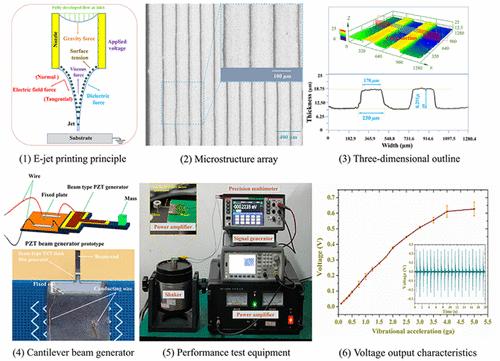Fabrication and Characterization of PZT Thick Film Microstructure and T-Shaped Generator by Electrohydrodynamic Jet Printing
IF 4.3
3区 材料科学
Q1 ENGINEERING, ELECTRICAL & ELECTRONIC
引用次数: 0
Abstract
This paper presents the use of electrohydrodynamic jet (E-jet) printing technology for fabricating PZT thick film microstructures directly on substrate surfaces. The resolution of a single-layer thickness of 0.5 μm is about 40 times that of the screen printing and casting methods. The minimum microstructure gap of 10 μm is comparable to that of wet etching. Flexible control of microstructural functional characteristics and dimensions can be achieved. The 10 μm thickness “T” shape microstructure was printed on the flexible titanium alloy substrate by electrohydrodynamic jet printing technology. The beam-type generator was formed by a high-temperature cofiring process, which avoided the problems of adhesive accuracy and adhesive layer creep introduced by the adhesive process. XRD spectra confirm that the printed thick films crystallize into a standard perovskite structure at high temperatures without any impurities. The microstructure at this scale has good flexible deformation. The piezoelectric generator demonstrates a unit volume power generation of 0.26 × 10–4 mV/μm3, roughly three times that of piezoelectric ceramic generators produced by spin coating. After 3000 vibration cycles, the output voltage of the generator remains stable, confirming the reliability of the printed microstructures and the potential of electrohydrodynamic jet printing in device applications.

利用电流体动力喷射打印技术制造 PZT 厚膜微结构和 T 型发电机并确定其特性
本文介绍了利用电流体动力喷射(E-jet)印刷技术直接在基材表面制造 PZT 厚膜微结构的方法。单层厚度为 0.5 μm 的分辨率约为丝网印刷和铸造方法的 40 倍。10 μm 的最小微结构间隙与湿法蚀刻相当。可以实现对微结构功能特性和尺寸的灵活控制。采用电流体动力喷射打印技术在柔性钛合金基底上打印出厚度为 10 μm 的 "T "形微结构。束型发生器是通过高温共烧工艺形成的,避免了粘合工艺带来的粘合精度和粘合层蠕变问题。XRD 光谱证实,印刷厚膜在高温下结晶成标准的包晶体结构,不含任何杂质。这种尺度的微观结构具有良好的柔性变形能力。压电发生器的单位体积发电量为 0.26 × 10-4 mV/μm3,大约是旋涂法生产的压电陶瓷发生器的三倍。经过 3000 次振动周期后,发生器的输出电压保持稳定,证实了印刷微结构的可靠性以及电流体动力喷射印刷在设备应用中的潜力。
本文章由计算机程序翻译,如有差异,请以英文原文为准。
求助全文
约1分钟内获得全文
求助全文
来源期刊

ACS Applied Electronic Materials
Multiple-
CiteScore
7.20
自引率
4.30%
发文量
567
期刊介绍:
ACS Applied Electronic Materials is an interdisciplinary journal publishing original research covering all aspects of electronic materials. The journal is devoted to reports of new and original experimental and theoretical research of an applied nature that integrate knowledge in the areas of materials science, engineering, optics, physics, and chemistry into important applications of electronic materials. Sample research topics that span the journal's scope are inorganic, organic, ionic and polymeric materials with properties that include conducting, semiconducting, superconducting, insulating, dielectric, magnetic, optoelectronic, piezoelectric, ferroelectric and thermoelectric.
Indexed/Abstracted:
Web of Science SCIE
Scopus
CAS
INSPEC
Portico
 求助内容:
求助内容: 应助结果提醒方式:
应助结果提醒方式:


